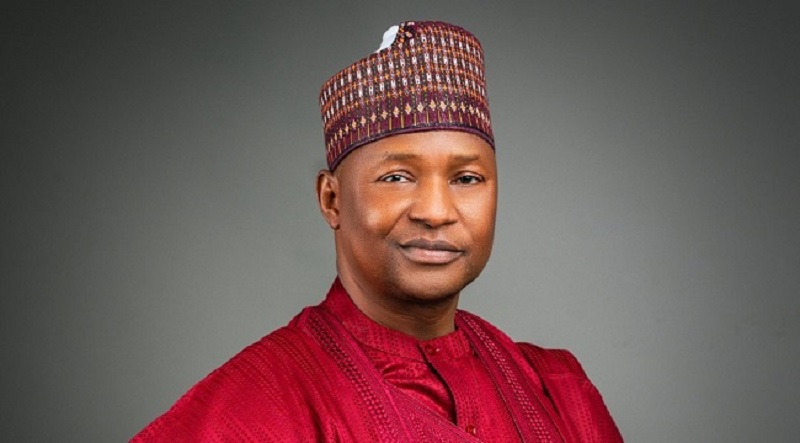General
SERAP to Block Buhari from Spending N26bn on Travels, Others

By Adedapo Adesanya
Socio-Economic Rights and Accountability Project (SERAP) has filed a lawsuit asking the Federal High Court in Abuja to stop President Muhammadu Buhari from spending N26 billion in the 2022 presidency budget on local and foreign travels, meals and refreshments, ‘sitting allowance’, ‘welfare package’, and office building.
In the suit number FHC/ABJ/CS/1361/2021 filed last Friday by its lawyers, Mr Kolawole Oluwadare and Ms Adelanke Aremo, SERAP is seeking: “an order of mandamus to direct and compel President Buhari to cut the N26bn presidency budget on local and foreign travels, meals and refreshments, and to send a supplementary appropriation bill to the National Assembly to reflect the reduction.”
SERAP also sought “an order of mandamus to direct and compel President Buhari to publish spending details on the State House Medical Center since May 29, 2015, to date; and to redirect some of the money on travels and meals to improve public healthcare facilities across the country.”
The agency further argued that, “The government would continue to borrow to fund the country’s budget until there is a substantial cut to the cost of governance. It is in the public interest to stop the government from spending so much money on these items. Persistent borrowing is neither sustainable nor fair to the Nigerian people.”
According to SERAP, “the huge spending by the presidency is neither necessary nor in the public interest, especially in the face of the country’s dire economic position, the scant allocations to education and health, and the growing level of borrowing by the Federal Government to fund the 2022 budget.
Additionally, SERAP noted that, “the Buhari administration has constitutional and fiduciary duties to ensure a responsible budget spending and the well-being and prosperity of Nigerians. Some of the proposed spendings could be better allocated to improve access of poor Nigerians to basic public goods and services.”
The organization equally argued that “any spending of public funds should stay within the limits of constitutional responsibilities, and oath of office by public officers, as well as comply with Chapter 2 of the 1999 Nigerian Constitution [as amended] relating to fundamental objectives and directive principles of state policy.”
Furthermore, SERAP maintained that “unless the reliefs sought are granted, the Federal Government will continue to benefit from the breach of the law, and the proposed spending of N26bn would leave the poorest and most vulnerable people without access to essential public goods and services, and burden the next generation.
“Cutting waste and apparently unnecessary spending would go a long way in addressing the budget deficit and debt problems.
“Stopping President Buhari from spending the proposed N26bn on travels and meals would ensure that the government is spending the country’s maximum available resources to respect, protect, and promote the rights to basic needs of the poor and marginalized groups.
“The proposed spending is unsustainable and would take away critical funding to provide access to quality healthcare and education.
“Public officers are mere custodians of public records. Nigerians are entitled to know how the commonwealth is being utilized, managed and administered in a democratic setting.
“According to reports, the proposed N26 billion on travels, meals, refreshments and the presidential wing of the State House Clinic is more than the proposed allocations for ongoing and new projects in 14 teaching hospitals combined. N19.17 billion is allocated to the following teaching hospitals: UNILAG Teaching Hospital—N1.69bn; ABU Teaching Hospital—N2.38bn; University College Hospital, Ibadan—N1.49 billion; and UNN Teaching Hospital—N1.38 billion.”
“UNIBEN Teaching Hospital—N1.35 billion; OAU Teaching Hospital—N1.35 billion; UNILORIN Teaching Hospital—N982 million; UNIJOS Teaching Hospital—N908 million; University of Port Harcourt—N1.14 billion; UNIMAID Teaching Hospital—N986 million; Dan Fodio University Teaching Hospital—N987 million; Aminu Kano Teaching Hospital—N2.49 billion; UNIABUJA Teaching Hospital—N1.90 billion; and ATBU Teaching Hospital—N947 million.”
No date has been fixed for the hearing of the suit.
General
Nigeria Okays Alphanumeric Digital Postcode System to Boost Delivery

By Adedapo Adesanya
Nigeria has finally approved the use of an alphanumeric digital postcode system for the country, 17 years after it was first considered.
According to the Minister of Communications and Digital Economy, Mr Bosun Tijani, the system was okayed at the Federal Executive Council (FEC) meeting on Wednesday, chaired by President Bola Tinubu, in line with the ministry’s strategic blueprint.
He said working in collaboration with the Nigerian Postal Service (NIPOST), the ministry will introduce a modern, geospatially intelligent addressing system that improves accuracy across the country and enables faster and more reliable mail and parcel processing.
“Beyond strengthening postal operations, the Digital Postcode System will also serve as an important national enabler supporting better national planning, improved emergency response, more efficient logistics and e-commerce, and the delivery of government services.
“As our digital economy continues to grow, foundational systems such as this play an essential role in building the infrastructure required to connect people, businesses, and services more efficiently across the country,” he said.
He noted that the approval represents another step forward in the Mr Tinubu-led administration’s commitment to building the enabling environment to support a modern, inclusive, and globally competitive digital economy.
On her part, Ms Tola Odeyemi, the Post Master General and chief executive officer of NIPOST, said the implementation is a foundational step toward building the digital infrastructure required for a modern economy.
“First conceptualised in 2009, this initiative is finally becoming a reality in 2026 under the leadership of President Bola Tinubu and the Minister of Communications, Innovation and Digital Economy, Dr Bosun Tijani,” she wrote on X, formerly Twitter.
“A digital postcode system is more than a postal reform. It is critical national infrastructure that enables e-commerce, logistics, emergency services, financial inclusion, security, urban planning, and effective public service delivery,” she added.
By introducing an alphanumeric addressing framework, Nigeria will now be able to identify locations with far greater precision across cities, towns, and rural communities.
“This will significantly improve how goods, services, and digital platforms reach Nigerians everywhere.
“This milestone reflects a shared commitment by the Federal Government to strengthen Nigeria’s digital backbone and unlock new opportunities for innovation, commerce, and national development,” she further stated.
General
NCDMB Targets Midstream Compliance to Boost Nigeria’s Industrial Growth

By Adedapo Adesanya
The Nigerian Content Development and Monitoring Board (NCDMB) has intensified its compliance drive in the oil and gas midstream segment, convening a high-level sensitisation workshop aimed at deepening adherence to the Nigerian Oil and Gas Industry Content Development Act.
The workshop, themed Compliance with the Provisions of the NOGICD Act 2010: A Pathway to Industrialization, held in Lagos, drew key operators across gas processing, transportation, storage and infrastructure development.
Speaking on behalf of the Executive Secretary of NCDMB, Mr Felix Ogbe, the Director of Monitoring and Evaluation Division, Mr Omomehin Ajimijaye, described the midstream sector as “a critical bridge between upstream production and downstream utilisation.”
“The midstream segment plays a pivotal role in gas processing, transportation, storage and infrastructure development, all of which are essential pillars for achieving Nigeria’s industrialisation agenda,” Mr Ajimijaye said.
Mr Ajimijaye stressed that adherence to the NOGICD Act goes beyond regulatory obligation.
“Compliance with the NOGICD Act is not merely a statutory requirement,” he stated. “It is a strategic imperative for sustainable national development.”
He explained that the programme was structured to clarify registration processes, Nigerian Content Equipment Certification, expatriate quota requirements, statutory reporting templates and submission timelines.
“Our objective is to deepen stakeholders’ understanding of compliance requirements, address recurring gaps identified during Monitoring and Evaluation reviews, and foster constructive dialogue on operational realities within the midstream space,” he added.
According to Mr Ajimijaye, the board has received feedback from operators highlighting challenges in meeting Nigerian Content obligations, including reporting complexities and varying interpretations of certain provisions of the Act.
“As a responsive regulator and development-focused institution, we remain committed not only to enforcing compliance but also to providing guidance, clarity and the necessary support to enable stakeholders succeed,” he assured participants.
With Nigeria positioning gas as a transition fuel and economic growth driver, regulatory clarity in the midstream space is essential to unlocking investment and local capacity development.
The participants received technical presentations from key NCDMB divisions, including: Monitoring and Evaluation Division, Project Certification and Authorisation Division, Capacity Building Division and Zonal Coordination Division.
The interactive sessions provided practical guidance on engagement protocols with the Board and strengthened collaboration between regulators and operators.
General
AGF Fagbemi Takes Over Malami Prosecution from DSS

By Adedapo Adesanya
The Minister of Justice and Attorney General of the Federation, Mr Lateef Fagbemi, has taken over the prosecution of his immediate predecessor, Mr Abubakar Malami.
Mr Malami is facing terrorism and illegal firearms possession charges brought against him by the Department of State Service (DSS).
Mr Fagbemi, a Senior Advocate of Nigeria (SAN), took over the trial from the secret police on Wednesday at the Federal High Court in Abuja.
The Director of the Public Prosecution of the Federation, Mr Rotimi Oyedepo, announced the Attorney General’s appearance in the matter.
Mr Oyedepo told Justice Joyce Abdulmalik that the trial cannot proceed because Mr Fagbemi has just taken over the prosecution.
He informed the court that the prosecution needed more time to familiarise itself with the facts of the case.
Counsel to the defendants, Mr Adedayo Adedeji, who did not oppose the application, however, urged the court to strike out the matter if the prosecution fails to open its case at the next adjourned date, citing lack of diligent prosecution.
Justice Abdulmalik subsequently adjourned the matter to March 10 for trial and for the prosecution to formally open its case.
The court had, on February 27, admitted Malami and his son, Mr Abdulaziz, to N200 million bail, with two sureties, each one of whom must own landed property either in Maitama or Asokoro.
Justice Abdulmalik had said that the title of the property must be deposited with the Deputy Chief Registrar of the Court along with valid international passports.
The sureties were also ordered to depose to an affidavit of means and submit their two recent passport photographs to the court.
Mr Malami and his son were also ordered to submit their international passports and recent passport photographs to the court.
The DSS had arraigned the ex-AGF and his son, Mr Abdulaziz, on a five-count charge bordering on terrorism and illegal firearms possession.
In the charge, marked FHC/ABJ/CR/63/2026, filed before the Federal High Court in Abuja, Malami is also accused of refusing to prosecute suspected terrorism financiers, whose case files were handed to him while he served as the AGF and Minister of Justice.
Mr Malami and Mr Abdulaziz are equally accused of warehousing firearms in their residence at Gesse Phase II Area, Birain Kebbi LGA, Kebbi State, without lawful authority.
The DSS accused Mr Malami in count one of the charge, with knowingly abetting terrorism financing, while the ex-AGF and his son are charged in counts two to five, with unlawful, possession of a Sturm Magnum 17-0101 firearm, 16 Redstar AAA 5720 live rounds of cartridges and 27 expended Redstar AAA 5’20 cartridges, contrary to and punishable under relevant Sections of Terrorism (Prevention and Prohibition) Act, 2022 and Firearms Act, 2004.
-

 Feature/OPED6 years ago
Feature/OPED6 years agoDavos was Different this year
-
Travel/Tourism10 years ago
Lagos Seals Western Lodge Hotel In Ikorodu
-

 Showbiz3 years ago
Showbiz3 years agoEstranged Lover Releases Videos of Empress Njamah Bathing
-

 Banking8 years ago
Banking8 years agoSort Codes of GTBank Branches in Nigeria
-

 Economy3 years ago
Economy3 years agoSubsidy Removal: CNG at N130 Per Litre Cheaper Than Petrol—IPMAN
-

 Banking3 years ago
Banking3 years agoSort Codes of UBA Branches in Nigeria
-

 Banking3 years ago
Banking3 years agoFirst Bank Announces Planned Downtime
-

 Sports3 years ago
Sports3 years agoHighest Paid Nigerian Footballer – How Much Do Nigerian Footballers Earn











